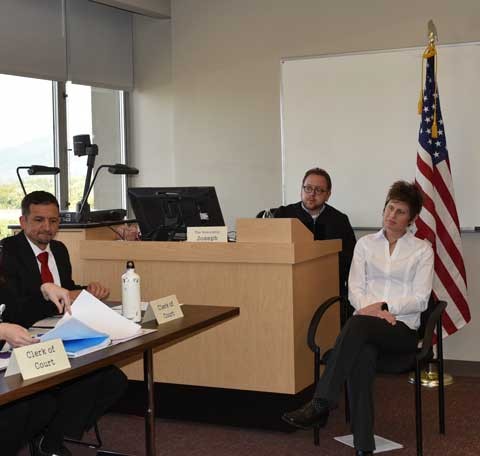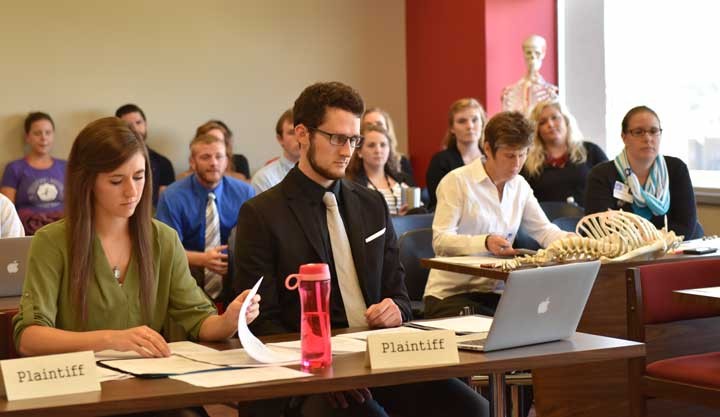DPT students step out of the clinic into a courtroom

Radford’s Doctor of Physical Therapy (DPT) students exchanged white coats for suits and the clinic for the courtroom on Oct. 19 in Roanoke.
They became prosecutors, defendants and legal researchers in a mock trial to understand liability and legal procedure as well as their profession’s particular need for proper documentation and communication.
The mock contributory negligence case was part of Assistant Professor Wil Kolb’s DPT 842 Professional Affairs class. Delegate Joseph Yost '06, M.S. '08, presided as judge over the case that involved a $750,000 claim by a fictional physical therapy patient who claimed an overzealous physical therapy assistant reinjured a surgically repaired rotator cuff during rehabilitation.
The students gleaned depositions from all parties involved for omissions in record keeping, procedural mistakes and breakdowns in communication. They also cross-examined participants and expert witnesses as they sought to assign responsibility for the client’s failed recovery.
Second year DPT students Julia Drapac and Jacob Dulski acted as the lawyers for the plaintiff. They said they got a unique perspective on their profession, as they had to challenge the work done by their professional counterparts.

Julia Drapac and Jacob Dulski, the plaintiff's lawyers, react to testimony during the recent DPT mock trial for contributory negligence, a classroom exercise.
I was certainly surprised by how closely our work can be scrutinized,” said Drapac, whose team spent more than 100 hours looking for breaches of protocol and holes in the documentation kept by the defendants, a mock physical therapy firm that modeled a company with which many of the future physical therapists would work.
“Communication and follow-up protect us,” said Dulski. “It was a sobering exercise. Any patient we treat could end up this way and we need to document as such and follow the precautions all the time.”
Kolb said the exercise was designed to incorporate the law, the American Physical Therapy Association code of ethics and the latest physical therapy training to develop the students’ clinical reasoning skills. He said it also tested the students’ verbal and written communication skills.
“I think the students now have a clear idea of just how much risk they are under in today’s health care setting and are better prepared to protect themselves,” said Kolb.
The class incorporated Physical Therapist Assistant (PTA) students from Jefferson College of Health Sciences (JCHS) under JCHS Assistant Professor Jordan Tucker. In practice, the DPT students will supervise the PTA’s who implement therapy designed by the DPTs.
Tucker was grilled as the PT practitioner whose work was at issue.
“The plaintiff’s attorneys came at me pretty aggressively,” said Tucker.
To prove negligence in Virginia, a defendant’s breach of duty and subsequent causation of injury have to be proven by the plaintiff. The defendants were ultimately found “not guilty” by the jury, made up of JCHS PTA students.
DPT Chair Kristen Jagger portrayed a biomechanics expert who was cross-examined about the stresses and strains placed upon a surgically repaired joint and the appropriateness of the therapy regimen designed for the patient.“It is a painful reality that these students may find themselves in this situation,” Jagger said. “They showed themselves willing to understand both the legal procedure and the ways they must operate to remain clear of it.”
“It is a painful reality that these students may find themselves in this situation,” Jagger said. “The scrutiny can be intense and they showed themselves willing to understand both the legal procedure and the ways they must operate to remain clear of it.”